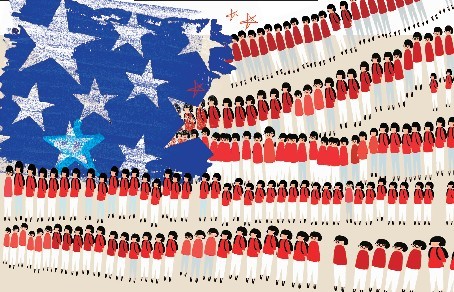


By Zhang Jing (张静)
Issue 611, Mar 18, 2013
Lifestyle, page 53
Translated by Laura Lin
Original article: [Chinese]
On Mar 9 and 10, many Chinese families were disappointed. It was on those two days that American private high schools announced their admission results for foreign students.
For those who have just been through the one-to-two year enrollment process that includes cramming for tests, sending application forms and recommendation letters, visiting schools and taking interviews, a negative result can be devastating. This year has been the worst year yet for middle class Chinese families hoping to send their children to private high schools in the U.S.
In the last five years, the number of Chinese children trying to get into prep schools in the U.S. has soared from just a few hundred to nearly 10,000. Meanwhile, school quotas for foreign students haven't changed, so it's getting increasingly difficult for Chinese children to get in.
"Last year a good student could still obtain three to four positive results whereas this year they would be lucky to get just one," says a consultant with a Chinese agency that specializes in finding study places abroad.
"Gaoshen" (高申), the abbreviation of a Chinese expression for "applying to an American high school," is a huge trend among China's middle class.
There are currently 23,795 Chinese teenagers in private high schools across America – not counting the ones who applied and failed.
The small (and only) hotel in Lakeville, Connecticut was packed with Chinese parents and teenagers in February during the Chinese New Year holiday. They were there to take an oral test at a well-known prep school. After talking together, the anxious families came to the same conclusion – gaoshen is a road of no return.
Most of the Chinese students enrolling in U.S. schools are excellent pupils who are willing to work hard to fulfill their dreams. However, once they decide to apply to study abroad, they have to spend less time on their studies and more time learning English and cramming for standardized tests and admission interviews.
Meanwhile, their current Chinese high schools have to be informed that they’re enrolling overseas so recommendation letters can be provided. If their applications fail, it's devastating for these children – not only are they embarrassed about not getting in, but they have to work twice as hard to catch up and prepare for their Chinese high-school and college exams.
Intensive Preparation
Some families prepare for gaoshen by sending their children to international schools in China early on. However, since these schools have a totally different curriculum than Chinese schools, their students are shut out from the Chinese education system and from taking college entrance exams.
Other families hedge their bets and enroll their children into U.S. universities after they’ve completed high school in China. The risk is that they face fierce competition from their Chinese peers who arrived in the U.S. four years earlier and attended a prep school.
To avoid all these issues, some families don’t hesitate to send their children abroad from an earlier age so that it will be easier for them to get into elite prep schools and prestigious universities.
Over the past few years agencies specialized in assisting Chinese families in the gaoshen process have boomed. Most of them do not call themselves intermediaries (中介) but educational consultants (教育咨询).
Whereas in developed countries education counseling is a proper profession where councilors understand the school system and get to know the children so that they can provide a tailored service, very few Chinese educational consultants have ever gone to school in the U.S. or understand the American education system. They often describe themselves as "teachers," but they are really salesmen whose job is to sell English lessons and cramming programs.
An "education consulting" fee can cost as much as 40,000 yuan ($6,500) at some of the more well-known agencies. The main revenue sources of these agencies are the various cramming courses they offer.
Fortunately, Chinese parents who have been through the whole gaoshen process like to share their experience and advice online. Some of them have even started ranking the top U.S. boarding schools online.
Chinese-Americans have also picked up on this great business opportunity and have also launched specialized services aimed at helping Chinese students get into top private schools.
The difference between the Chinese and U.S. prep schools is that the latter attach greater importance to nurturing their pupils in the American culture, sense of responsibility, behavior and manners. "The focus of American education is to cultivate students' interests in knowledge and the ability to learn knowledge,” said Wu Xiaohui, principal of the Michael Academy near Washington D.C. “It aims to foster multiple talents with independent thinking. This is what quality education is about."
News in English via World Crunch (link)


